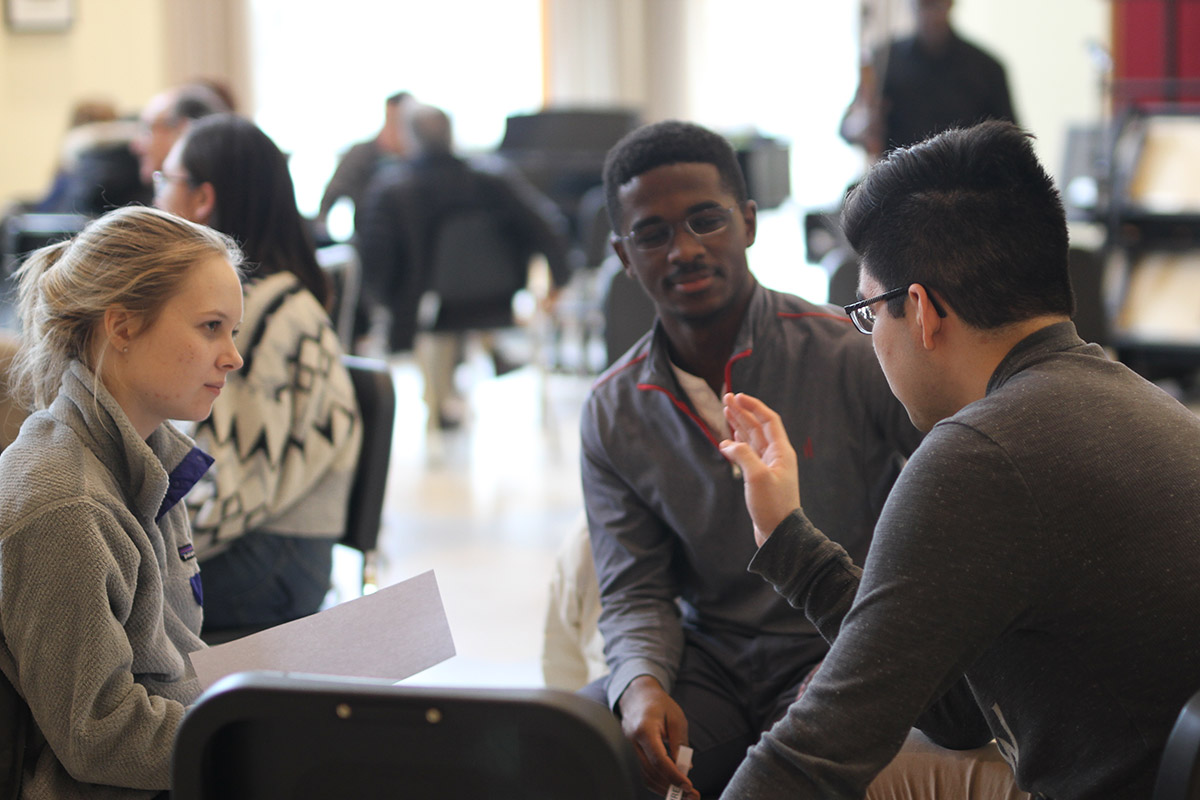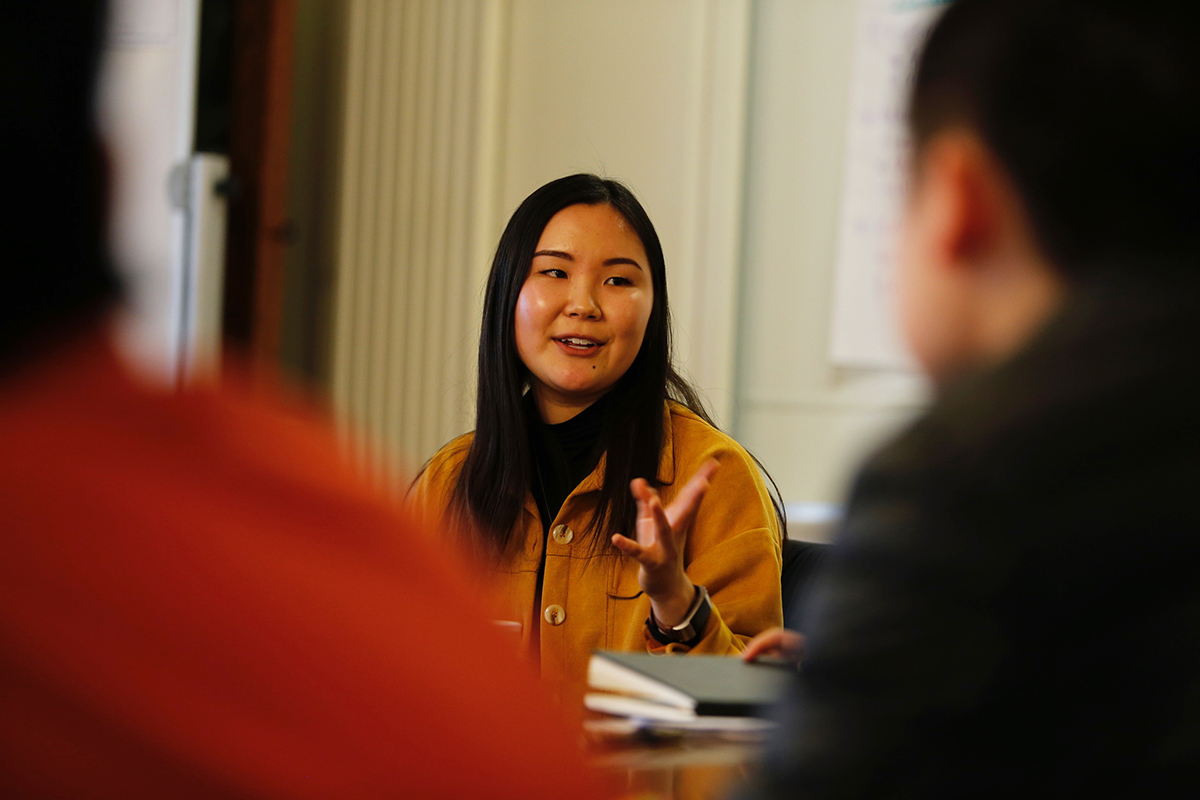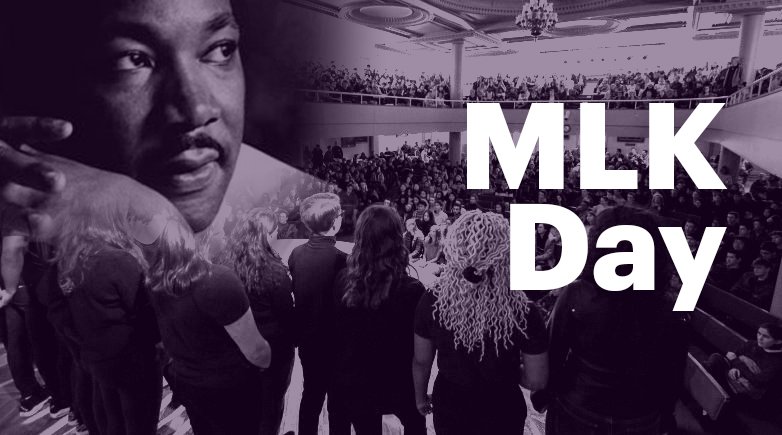2019 MLK Day at Exeter
Exonians investigate “Gen Z Activism” with a series of events honoring the slain civil rights leader. Click the arrow to hear students reflect on the day's programming.
With Dr. Martin Luther King Jr.'s life and legacy as a foundation for discussion, Exeter gathered Friday to examine and reflect on issues of race, equity and inclusion — in our community and beyond.
A host of guest speakers joined students, faculty and staff in a series of breakout sessions, kicked off with a morning keynote by Andrea Taylor, president & CEO of the Birmingham Civil Rights Institute.
PEA has celebrated MLK Day for more than a quarter-century, using the occasion to study through a variety of lenses the slain civil rights icon's message of peaceful social progress. This year's focus: "Gen Z Activism."
'You have power'
Interim Principal Bill Rawson introduced MLK Day as a “gift to all of us.” With students, faculty and staff gathered in Love Gym, Rawson said, “Every day we have an opportunity to ask ourselves what kind of school we want to be, what kind of community we want to be, what kind of persons we want to be.”
He encouraged students to reflect throughout the day's workshops on the life of Martin Luther King Jr. and ask themselves, “How do you want your voices to be heard? How do you want your story to be a part of the larger narrative that we call humanity?”
MLK Day keynote speaker Andrea Taylor’s message to Gen Z Exonians: “You have the capacity to take us to the next level of technology and innovation to spur social change.” #mlkday #iamexeter pic.twitter.com/TpWgYnrZrp
— Phillips Exeter (@PhillipsExeter) January 18, 2019
Taylor was introduced by her son, Trustee Wole Coaxum ‘88.
“Activism is in her blood,” Coaxum said. He talked about her upbringing in West Virginia, where she was surrounded by activists, and where she met many of the civil rights leaders of the day. “Activism and engagement are very strong Exeter traits that all of us share,” he observed. “I’d like to introduce the most transformative person in my life to a community that continues to transform my life,” he said as the audience applauded.
In her touching keynote titled “The DNA of Gen Z: Agency, Creativity and Legacy,” Taylor spoke about the role of young people in making change. “You have agency. You have power, the inherent power to judge your situation, hopefully with the help of elders, and to take action to bring about change that is timeless and universal. “ She continued, “The baton is passing to a new generation and young people are at the epicenter of using their power to make a difference in their community and continuing to achieve the dreams that Martin Luther King spoke so eloquently about.” She concluded by encouraging action. “I urge each one of you Gen Z students to ask yourself what will you do to expand the dream?”
The keynote was preceded by a performance of “We Shall Overcome” by PEA’s Concert Choir and a moving introduction by two student members of the MLK Day Committee.
Music ended the session with a stirring performance of Pachelbel's Canon by members of the Roxbury Youth Orchestra, sponsored by David France and the Revolution of Hope, joined by members of PEA’s orchestra. Afterward, Axel, one of the Roxbury Youth Orchestra musicians, introduced his Boston colleagues and addressed the crowd. “Being here shows what community can do. We’re a family now,” he said, referring to the Exeter students who had opened up their dorm rooms to the visitors, “even though we just met yesterday!”
An athlete's voice
Former NFL player and current University of New Hampshire Assistant Football Coach Chris Ellis implored our students and athletes to use their voice for others and be an ally. Ellis noted that athletes have a platform in American culture to promote change — and an obligation to use that platform with good judgment.
“You have a responsibility to do something outside yourself, for the betterment of others," he said.
"Just because it’s not your fight, does not mean you can’t throw punches. Be accountable and responsible for your words."
Embrace your heritage
Students and faculty gathered in Assembly Hall for “Precious Knowledge,” a workshop based on a 2011 documentary film of the same name. The film chronicles the Mexican American Raza Studies Program at Tucson High School and the Arizona state government’s attempts to shut down the classes.
“Precious Knowledge” producer Eren McGinnis introduced the workshop and screened the film’s trailer. McGinnis also played a clip from the film featuring a student named Nacho who advocated the Raza Studies Program’s importance. “These classes teach us to love one another,” Nacho said.
Tucson High School teacher Jose Gonzalez, a subject of the film, challenged students to think critically and have discussion based on various prompts. Gonzalez also encouraged students to embrace their heritage. “Don’t run from your culture, run to it. It will save your life,” Gonzalez said.
Pricila Rodriguez, a former student of the Raza Studies Program and a third-year doctoral student at the University of San Diego, joined Gonzalez on stage to discuss the work of Paulo Freire, specifically, “The Pedagogy of the Oppressed.” Rodriguez extolled to need for dialogue in education, praising the Harkness approach after sitting in on a PEA class earlier in the week.
Echoing the sentiments of MLK, McGinnis made an appeal to the audience saying, “I hope we can all move together forward with love, creativity and passion.”
Imagine!
“Imagine a world without slums, war, injustice,” said David France to the 30 attendees at his workshop on arts-based social change. France, the executive director of Boston-based Revolution of Hope, challenged the participants to develop plans for creating social change, using a framework he has developed from his own life experience. Focus on P-O-I-L, he said: problem, opportunity, intersection and legacy. He described his own work to create the Roxbury Youth Orchestra starting with nothing: France was homeless, had no instruments and no location for the orchestra to rehearse. Yet, he succeeded. In one month he collected 28 used violins. Soon, he had a place to live and a school gave him space in the gym to rehearse.

With this inspiration, the Exonian participants broke up into small groups and used France’s framework to develop plans for several major social problems: the stigma of mental illness, access to clean water, prisons and the criminal justice system, unreasonable working hours, reducing negative human impact on the environment. The solutions included an urban sound installation (music), mock trials in prisons (theater) and development of building insulation from recycled plastics (architecture).
Frances’s concluding thought: “Imagine. More than money, it takes people who can dream their way out of a box.”
Justice is complicated
Alum Rachel Rhoades ’04 and Malyuun Ali introduced students to “intersectionality” — a term coined by Kimberlé Crenshaw decades ago to describe the interconnection between different social categorizations like race, class and gender, that lead to oppression or discrimination.
In small, breakout groups, students and faculty prepared tableaus or short scenes about issues of social justice and environmental justice. The groups took on themes of climate change, indigenous rights and anti-black racism. The resulting performances sparked spirited conversation as viewers commented on others' work and shared personal stories of when they experienced injustice.
“When you act these ideas and experience out with your body,” says Rhoades, “it really stays with you.” It’s the embodiment of empathy.
Racism large and small
During the afternoon session of breakouts, Julie Chung ’16 led a workshop titled “Asian American Activism: Where Do We Fit?” for dozens of students and faculty in a packed Latin Study. Chung, now a junior studying Social Anthropology with a secondary degree in Global Health and Health Policy at Harvard, guided a discussion that touched on themes of identity, privilege and racism within the Asian-American community. Chung set a welcoming tone and prompted students to think about what their ethnicity means to them in terms of identity.
“The Asian-American identity is so complex, but it is what you make out of it,” Chung said.
A prevailing topic throughout the discussion was racism, at both a structural and personal level, and what can be done to combat it. Chung acknowledged how uncomfortable it can be to confront racism, especially when it comes from a relative or loved one. Present for the session was Khine Win ’20 who shared her feelings about the challenge of speaking up against racist sentiments.
“I don’t always feel like I’m in the position to correct someone when I haven’t had the same life experiences as they have,” Win said.
Chung ended the session by asking students to pledge a “commitment to change.” Each student wrote a personal statement with various ways they vowed to get involved at a personal, community and political level to promote a positive change in race relations.

On stage, 'UnSilenced'
A series of drop-the-mic performances Thursday night in Assembly Hall tore open the curtain on the annual commemoration.
"UnSilenced," a showcase of song, rap, film, spoken word and poetry, set the stage for Friday's day-long programming with 13 acts that were poignant and powerful. Original works by Eugene Hu '19, Elizabeth Kostina '20 and Osiris Russell-Delano '21 electrified the audience, with Adia Allison '21 closing the evening with a rendition of Sam Cooke's "A Change is Gonna Come."
—Patrick Garrity

